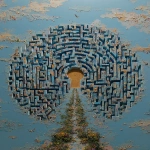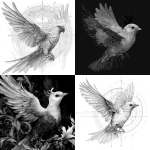Explore the Best AI Image Gallery

Quantum Computing Breakthroughs: Shaping the Future of Creativity and Ethics
Quantum computing has emerged as one of the most impressive technological achievements of the 21st century, promising to revolutionize various sectors, including finance, healthcare, and yes, even the creative industry. With its ability to perform computations at unprecedented speeds, quantum computing has the potential to unlock new realms of creativity.
The Power of Quantum Computing
At its core, quantum computing harnesses the principles of quantum mechanics to process information in ways that traditional computers cannot. Unlike classical bits, which represent either a 0 or 1, quantum bits (qubits) can exist in multiple states simultaneously, enabling a level of parallelism that opens up immense possibilities.
Impact on Creative Industries
While it may seem abstract, the impact of quantum computing on the creative industries is poised to be substantial. From generative art and music composition to virtual reality and game design, the application of quantum algorithms can enhance creativity in ways previously thought unattainable.
- Generative Art: Quantum computing offers artists powerful tools to generate intricate patterns and visual effects that can be influenced by complex mathematical principles. This allows for the creation of art that evolves in real-time, offering viewers a unique experience.
- Music Composition: Musicians could leverage quantum algorithms to compose scores that consider countless variables, including emotional impact, tempo, and audience interaction. This could lead to personalized music experiences that evolve based on listener preferences.
- Game Development: Quantum mechanics can contribute significantly to AI in games, enhancing non-player character behavior and allowing for more complex environments that adapt to user actions.
Ethical Considerations
As with any groundbreaking technology, quantum computing does not come without its ethical concerns. While its potential to revolutionize creativity is significant, it also invites scrutiny about the consequences of its applications.
Creative Authorship
A critical issue is the question of authorship in art created with the aid of quantum algorithms. Who owns a piece of work generated by a computer algorithm? The artist, the programmer, or perhaps the machine itself? As creative boundaries blur, defining ownership can become challenging.
Data Privacy
Quantum computers are capable of processing vast amounts of data at lightning speed, which raises concerns regarding data privacy and security. Creative fields often rely on user data to tailor experiences. If quantum computing can decipher protected information, this could have far-reaching consequences for individuals' privacy.
Implications for Employment
Another ethical consideration involves the potential displacement of creative jobs. As quantum technologies advance, will the need for human artists diminish? It is essential to ensure that technological advancements supplement human creativity rather than replace it.
Future Trends
The future of quantum computing appears bright, with several trends emerging that will shape its evolution in the creative sector:
- Collaboration with AI: The convergence of quantum computing and AI may lead to the development of highly sophisticated tools that can assist artists in intricate tasks from concept development to final execution.
- Widespread Accessibility: As quantum technology matures, we can anticipate quantum computing resources becoming more accessible, allowing a wider array of creatives to explore its possibilities.
- Educational Initiatives: Increased awareness and educational efforts will cultivate a new wave of talent skilled in quantum programming and its applications, ensuring that the creative industry evolves alongside technology.
In conclusion, the breakthroughs in quantum computing have the potential to reshape the creative industry, offering innovative tools and opportunities for artists, musicians, and designers. However, as we embrace these advancements, we must remain vigilant regarding the ethical implications they pose. By fostering discussions around these challenges, we can harness the power of quantum computing responsibly and creatively.

](https://images.ai-img.art/thumbnails/150/a2e728c4e462bef482c106719df04081c360d4444d4d154c22318725b7bcb124.webp)






](https://images.ai-img.art/thumbnails/150/bc924c2b4ba958c2aabf177b116f47053317904ae6e56b84db3f7dc2d666c080.webp)














](https://images.ai-img.art/thumbnails/150/4a7a4d6bca6b537f112483b9db13c7dfe541bb35fd8a022bdd131714cc60622a.webp)



](https://images.ai-img.art/thumbnails/150/024a13ae047c60649b5e7b4f5a71cb7e8a0e8838266fedbd1cb342ac1d2e951c.webp)

](https://images.ai-img.art/thumbnails/150/815d563985dccec04e21f9a9fa89f09cadc6693be7c6d8ab87defff2b61d417e.webp)




](https://images.ai-img.art/thumbnails/150/3478bd7a5bba66ae70209eef4f2b09837ef09ca033a7511ea86692824661b0a8.webp)


](https://images.ai-img.art/thumbnails/150/6917eea85c775b7876cfba66dfdcae79d6f026ca442f0dfa77824f5af58cfbb0.webp)
](https://images.ai-img.art/thumbnails/150/5f48fc91b83cfbe17932638af412d0c3a1649ed43692e334aa8cfb9b653153d0.webp)










